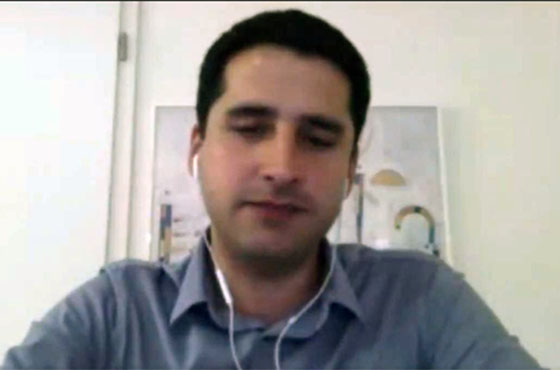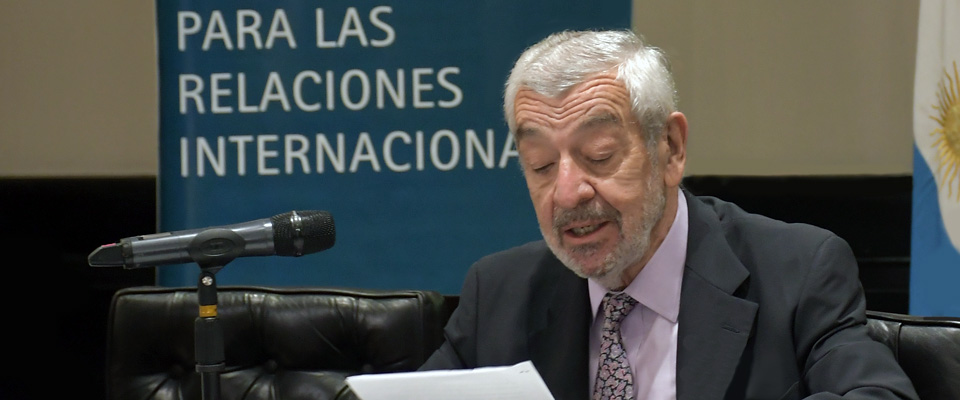
September 10, 2020
Professor Luis Schenoni's doctoral thesis Presentation "Bringing War back In: Victory and state formation in nineteenth century"
By Tomás A. Seré, Volunteer for the Communications Division
Translation by Isabel Rocco
During quarantine, the Argentine Council for International Relations (CARI) regularly offers open-ended virtual meetings for anyone who wishes to expand their knowledge and interact with elite professionals. On Thursday, September 10, it was Professor Luis Schenoni's turn, who presented his doctoral thesis "Bringing War Back In: Victory and state formation in the nineteenth-century".
In this context, under the moderation of CARI Secretary General Francisco de Santibañes and Academic Secretary Juan Battaleme, Schenoni spoke to all the participants of the academic session about his research on the effect of war on the formation of states in Latin America. In this regard, the professor at the German University of Constance incorporated an innovative vision into the debate about the importance of war in the configuration of the continent.
With this logic, Schenoni is part of the basis of the bellicose theory of state formulation (the sum of bureaucracy plus tax-raising capacity), but opens a third line of interpretation. Essentially, his thesis does not stop at the vision of many bellicose theorists, who think that war generates the state because of its capacity to mobilize, for at that time nations have to extract raw material from the population, and their bureaucracies grow (and then they keep them after the conflict). Nor is it the idea of mobilization, in which at one time of the war the most efficient states are selected and the others are eliminated.
In fact, according to the author, separating from these two premises was precisely what generated an anti-war consensus on the formation of states in Latin America. At this point there are two main ideas: One developed by Michelangelo Centeno, which rejects the possibility of the mobilization factor because in America wars were never total, nor did they need a complete militarization of society, and another point that the continent did not have an effect of selecting and eliminating small entities either. Indeed, for Schenoni, it is from these two ideas that Latin America is seen as the exception to the rule of the bellicolist theory of state formation.
However, in his thesis, the professor opens a new window that denotes the importance of wars in the formation of the states of our continent. As a first step, Schenoni identifies that the greatest growth in the state hierarchy of Latin American countries occurs in the 19th century, even in the time of the most intense wars in the region. From here comes the central point of his theoretical development: states with greater state capacity tend to be the winners of the wars of the nineteenth century, and, on the contrary, losers tend to consolidate themselves as the least-developed countries in terms of bureaucracy and collection.
In this context, Schenoni articulates an uncommon vision of the theory. "What one might think is that in the post-war period the results of losers and winners may be different. Winners who consolidate and losers who discredit themselves and whose institutions are dismantled", explained the professor. He added: "The point is in line with classic bellicose theorists, like Max Weber, who thought that wars had not only a state effect during the run-up to war (tax collection, bureaucracy), but also in the post".
Thus, through an experiment that analyzes the states of Latin America between 1860 and 1885, Schenoni seeks in his doctoral thesis to understand what the long-term impact of defeat in the wars of the nineteenth century was on the state capacity of the losers. "In short, statistical models show that the losing countries had a long-term loss in their state capabilities", the speaker said. In turn, from the synthetic control method, it contrafactually demonstrates what the development of these countries would have been if they had not fallen defeated in the war. "We can see, for example, that the construction of railway lines in Paraguay and Peru would have shot up completely in the event of war victories in these nations. And it would have happened to per capita income or tax-collection capacity", Schenoni argued. This logic also derives the reason for the greater development of certain countries (the winners: Argentina, Brazil, Uruguay, Chile, Costa Rica, etc.) in Latin America in the face of the two great wars in that period, that of the Triple Alliance (1864-1870) and that of the Pacific (1879-1883).
In short, Schenoni stated that his thesis "is not a kind of apology of war as the creator of the state, but seeks to bring its dual effect to the forefront. They all went into battle thinking they would win, and half of them ended up destroying their state". In this context, Juan Battaleme, at the close of the meeting, highlighted the relevance of the work to apply perfectly to the current context. "It is published at a time when Latin America is internally discussing issues of armed forces, of demilitarization. It shines light at a very particular time and tells us: 'Yes, wars had an effect on the continent'. It shows that victory does not give rights (that vision that was perpetuated in Argentina), but that it did have a huge influence on the creation of states", he celebrated.


























